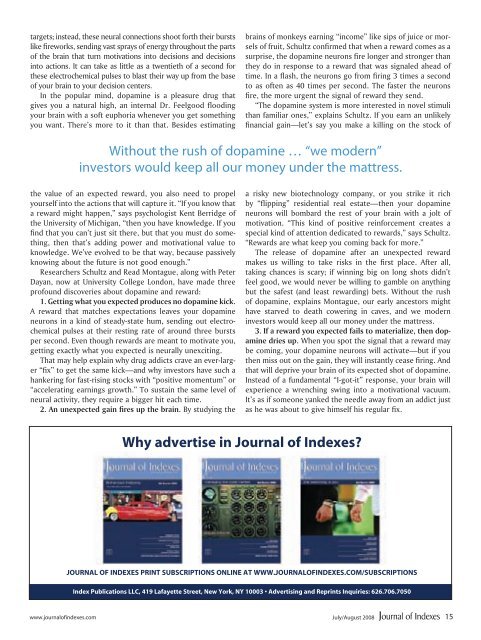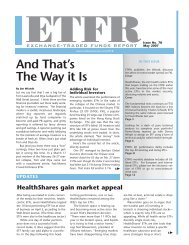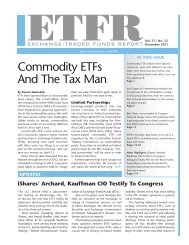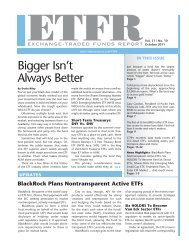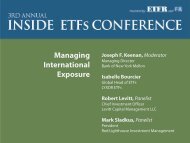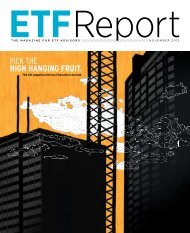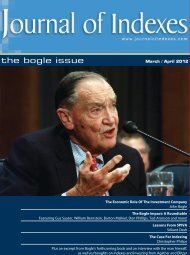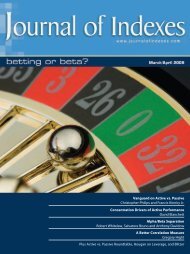Download - IndexUniverse.com
Download - IndexUniverse.com
Download - IndexUniverse.com
Create successful ePaper yourself
Turn your PDF publications into a flip-book with our unique Google optimized e-Paper software.
targets; instead, these neural connections shoot forth their bursts<br />
like fireworks, sending vast sprays of energy throughout the parts<br />
of the brain that turn motivations into decisions and decisions<br />
into actions. It can take as little as a twentieth of a second for<br />
these electrochemical pulses to blast their way up from the base<br />
of your brain to your decision centers.<br />
In the popular mind, dopamine is a pleasure drug that<br />
gives you a natural high, an internal Dr. Feelgood flooding<br />
your brain with a soft euphoria whenever you get something<br />
you want. There’s more to it than that. Besides estimating<br />
brains of monkeys earning “in<strong>com</strong>e” like sips of juice or morsels<br />
of fruit, Schultz confirmed that when a reward <strong>com</strong>es as a<br />
surprise, the dopamine neurons fire longer and stronger than<br />
they do in response to a reward that was signaled ahead of<br />
time. In a flash, the neurons go from firing 3 times a second<br />
to as often as 40 times per second. The faster the neurons<br />
fire, the more urgent the signal of reward they send.<br />
“The dopamine system is more interested in novel stimuli<br />
than familiar ones,” explains Schultz. If you earn an unlikely<br />
financial gain—let’s say you make a killing on the stock of<br />
Without the rush of dopamine … “we modern”<br />
investors would keep all our money under the mattress.<br />
the value of an expected reward, you also need to propel<br />
yourself into the actions that will capture it. “If you know that<br />
a reward might happen,” says psychologist Kent Berridge of<br />
the University of Michigan, “then you have knowledge. If you<br />
find that you can’t just sit there, but that you must do something,<br />
then that’s adding power and motivational value to<br />
knowledge. We’ve evolved to be that way, because passively<br />
knowing about the future is not good enough.”<br />
Researchers Schultz and Read Montague, along with Peter<br />
Dayan, now at University College London, have made three<br />
profound discoveries about dopamine and reward:<br />
1. Getting what you expected produces no dopamine kick.<br />
A reward that matches expectations leaves your dopamine<br />
neurons in a kind of steady-state hum, sending out electrochemical<br />
pulses at their resting rate of around three bursts<br />
per second. Even though rewards are meant to motivate you,<br />
getting exactly what you expected is neurally unexciting.<br />
That may help explain why drug addicts crave an ever-larger<br />
“fix” to get the same kick—and why investors have such a<br />
hankering for fast-rising stocks with “positive momentum” or<br />
“accelerating earnings growth.” To sustain the same level of<br />
neural activity, they require a bigger hit each time.<br />
2. An unexpected gain fires up the brain. By studying the<br />
a risky new biotechnology <strong>com</strong>pany, or you strike it rich<br />
by “flipping” residential real estate—then your dopamine<br />
neurons will bombard the rest of your brain with a jolt of<br />
motivation. “This kind of positive reinforcement creates a<br />
special kind of attention dedicated to rewards,” says Schultz.<br />
“Rewards are what keep you <strong>com</strong>ing back for more.”<br />
The release of dopamine after an unexpected reward<br />
makes us willing to take risks in the first place. After all,<br />
taking chances is scary; if winning big on long shots didn’t<br />
feel good, we would never be willing to gamble on anything<br />
but the safest (and least rewarding) bets. Without the rush<br />
of dopamine, explains Montague, our early ancestors might<br />
have starved to death cowering in caves, and we modern<br />
investors would keep all our money under the mattress.<br />
3. If a reward you expected fails to materialize, then dopamine<br />
dries up. When you spot the signal that a reward may<br />
be <strong>com</strong>ing, your dopamine neurons will activate—but if you<br />
then miss out on the gain, they will instantly cease firing. And<br />
that will deprive your brain of its expected shot of dopamine.<br />
Instead of a fundamental “I-got-it” response, your brain will<br />
experience a wrenching swing into a motivational vacuum.<br />
It’s as if someone yanked the needle away from an addict just<br />
as he was about to give himself his regular fix.<br />
Why advertise in Journal of Indexes?<br />
journal of indexes print subscriptions online at www.journalofindexes.<strong>com</strong>/subscriptions<br />
Index Publications LLC, 419 Lafayette Street, New York, NY 10003 • Advertising and Reprints Inquiries: 626.706.7050<br />
www.journalofindexes.<strong>com</strong> July/August 2008<br />
15


